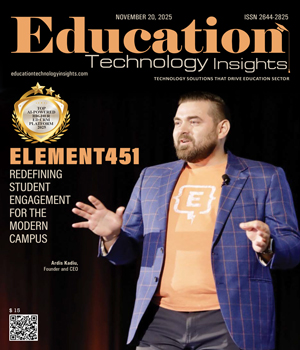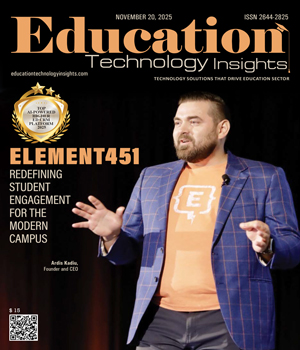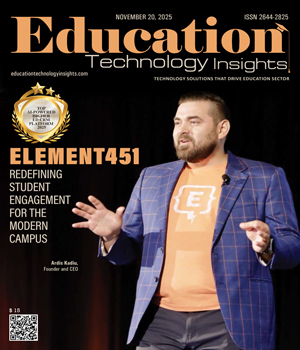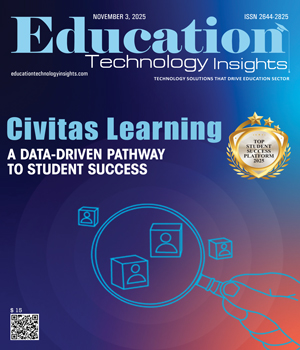THANK YOU FOR SUBSCRIBING
Be first to read the latest tech news, Industry Leader's Insights, and CIO interviews of medium and large enterprises exclusively from Education Technology Insights
Building a Culture of Purpose-Driven Digital Change
Milos Topic, Vice President for Information Technology & Chief Digital Officer, Grand Valley State University
 Milos Topic, Vice President for Information Technology & Chief Digital Officer, Grand Valley State University
Milos Topic, Vice President for Information Technology & Chief Digital Officer, Grand Valley State UniversityMiloš Topić serves as Vice President for Information Technology and Chief Digital Officer at Grand Valley State University. With more than two decades of experience in higher education IT, his career has been driven by a commitment to continuous learning, service and innovation. He has held several leadership roles, including Vice President and CIO, Chief Technology Officer at Saint Peter’s University and Director of Technology Services at Montclair State University. Topić believes IT an enabler of others and a strategic partner in shaping institutional priorities. He was drawn to GVSU by its strong focus on student success, equal opportunities, and courage to be innovative. Now, he leads digital transformation efforts through cross-functional collaboration and integrated strategies that enhance both academic and operational areas of the university.
Through this article, Topić delves into aligning technology with human needs, institutional goals and a culture that embraces continuous learning and change.
Driving Agile Innovation: Embracing Innovation Through Modern Technology
One of the biggest challenges—and opportunities—has been navigating the sheer breadth of the IT portfolio while ensuring alignment with institutional goals. From enterprise systems to classroom tech and cybersecurity, each function has its own nuances.
To manage this complexity, we've moved toward a more agile, collaborative model, focusing on strategic partnerships across divisions and departments. We’ve worked to break down silos and ensure that IT is seen not just as a utility, but as a trusted advisor across the university. Adapting also means evolving our governance structures, streamlining legacy systems and being proactive rather than reactive in our infrastructure planning. We’re investing in AI, automation, cloud technologies and data-informed decision-making to be more responsive and scalable.
Bridging Digital Gaps: Equitable Learning That Supports All
Equity in access is a cornerstone of our digital strategy. We’ve taken several steps to ensure no one is left behind. This includes investing in loaner device programs, expanding Wi-Fi access (even into parking lots and remote areas) and providing digital literacy training for students, faculty and staff.
“We combine technical controls with a strong focus on user education, since people remain both our greatest strength and potential vulnerability”
Our team also partners with faculty to design inclusive learning environments, including ensuring all digital tools meet accessibility standards. And we’ve created support structures such as IT service desk and peer-led tech coaching to meet people where they are. We recognize that digital equity isn’t just about tools, it’s about trust, training and timely support.
Cyber Vigilance: A People-Centered Approach to Cybersecurity
Cybersecurity is a dynamic, ever-changing landscape. At GVSU, we’ve adopted a layered security model grounded in risk-based frameworks such as NIST and ISO 27001. We combine technical controls with a strong focus on user education, since people remain both our greatest strength and potential vulnerability.
Key practices include regular security audits, incident response simulations, multi-factor authentication, endpoint protection and continuous monitoring through a modern Security Operations Center (SOC). We also prioritize transparency and communication— educating the campus community on phishing, data protection and responsible tech use. Security is everyone’s responsibility and we work hard to make that a shared value, not just an IT policy.
Culture of Change: Grounding Innovation in Trust, Purpose and Progress
Start with relationships. Transformation in higher education isn’t just about tech— it’s about trust. Build partnerships, listen deeply and align your technological initiatives with what matters most to your institution: student success, faculty excellence and operational sustainability.
Also, don’t wait for perfect conditions—start where you are with what you have. Innovation doesn’t always require large budgets; it requires clear purpose, incremental progress and a culture that embraces change. Be transparent, communicate often and celebrate small wins.
Finally, lead with curiosity and humility. The landscape is always shifting—what worked yesterday may not tomorrow. Stay open to learning, adapt quickly, and be relentless in your pursuit of creating meaningful, human-centered digital experiences.
Read Also
Empowering Educators through Purposeful, Connected and Transformative Learning
Empowering Students to Lead: A New Vision for Civic Learning
The Director's Playbook: Strategic Digital Transformation in Rual Hyper-Growth Districts
The Art and Architecture of Student Support
From At-Risk to At-Promise: The Language Revolution Higher Education Needs
Teaching Tomorrow: How Western Governors University Is Redefining Teacher Preparation

I agree We use cookies on this website to enhance your user experience. By clicking any link on this page you are giving your consent for us to set cookies. More info
























